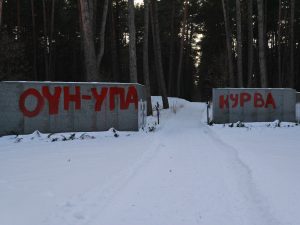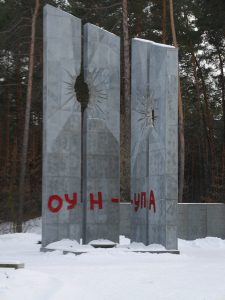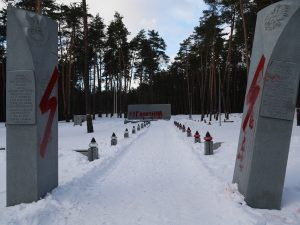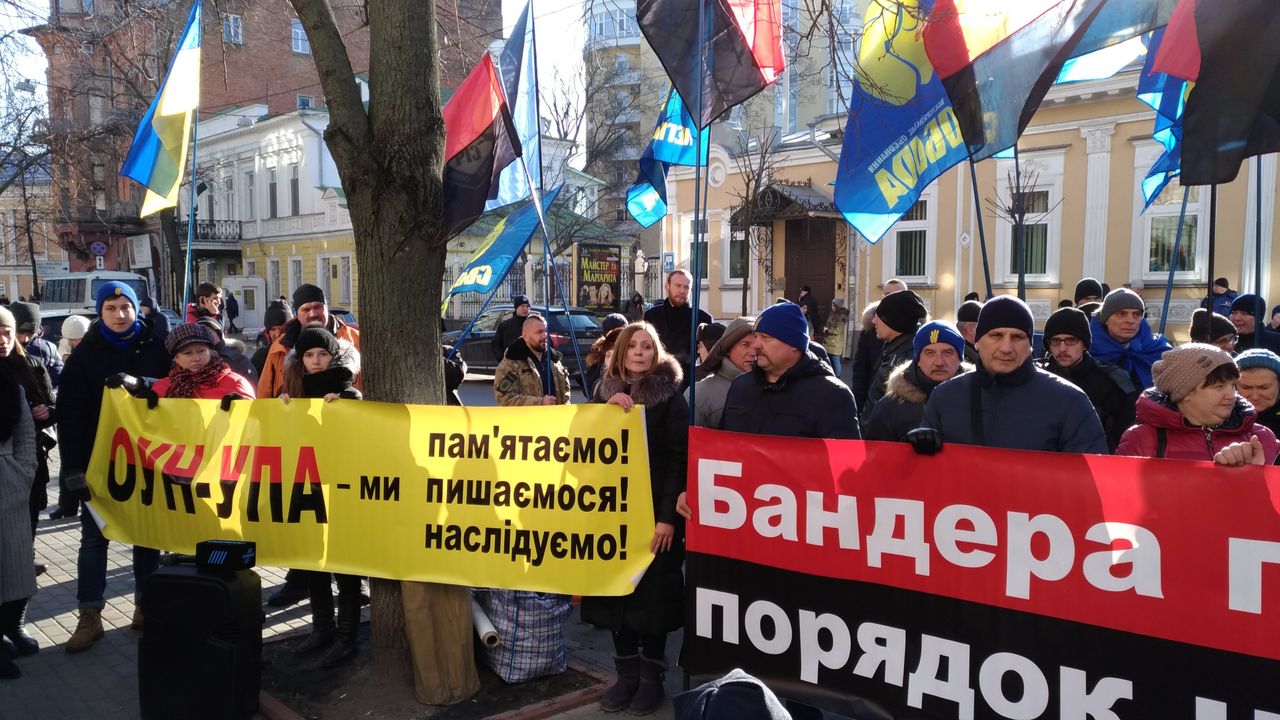The tension in Polish-Ukrainian relations
Since 2013 the events in Ukraine (Euromaidan, the annexation of Crimea by Russia, war in the east of the country) have led to the change in the historical policy and ideology of Ukraine. Historic events and heroes from the past, connected with the nationalist movement and the struggle of the Ukrainian Insurgent Army, started to appear more often in the collective consciousness. Such policy was not anti-Polish and was related to the struggle of Ukrainian nationalists with the Soviet Union.
In Poland it was perceived as making Bandera a hero and the massacres of Poles in Volhynia and Eastern Galicia were reminded. The change of historical policy in Poland was related to the Law and Justice party winning the elections as well as to the entry to the Parliament the Kukiz'15 party, which has some representatives of nationalist forces among its members.
In April 2015, when the President of the Republic of Poland, Bronislaw Komorowski, visited Kiev, the Ukrainian Parliament adopted the law recognizing the members of Ukrainian Insurgent Army as the ones who fought for the independence of Ukraine. Kiev assured that it was not done on purpose. It was met with disbelief in Poland.
On July 22, 2016, the Parliament of the Republic of Poland recognized as genocide the crimes committed by the Ukrainian nationalists on Polish population in Volhynia and Eastern Galicia between 1943 and 1944.
At the beginning of 2017 there were several incidents aimed at Polish-Ukrainian relations. First, unknown perpetrators destroyed a monument of Polish victims of Ukrainian nationalists in Huta Pieniacka. Then, the Polish and Ukrainian cemetery in Bykownia was devastated.


 On the night of 7-8 February, the Polish Consulate in Lviv was pelted with paint. On the night of 28-29 March, unknown perpetrators fired a grenade launcher towards the Consulate General of the Republic of Poland in Lutsk. It was described by the Security Service of Ukraine as a terrorist act.
At the same time, Polish authorities decided that they would not support financially the celebrations of the “Vistula” Action anniversary in Poland.
Things went from bad to worse. In April 2017, a monument dedicated to UPA soldiers was removed from the cemetery in Hruszowice in the Przemysl county. In response, the next day the Ukrainian Institute of National Remembrance announced the suspension of the legalization process of Polish monuments in Ukraine. The Institute found illegal 105 Polish monuments and memorial signs built in Ukraine in 1991-2017.
On November 9, the newspaper Dziennik Gazeta Prawna announced that the Director of the Ukrainian IPN, Volodymyr Viatrovych, was prevented from entering Poland.
On the night of 7-8 February, the Polish Consulate in Lviv was pelted with paint. On the night of 28-29 March, unknown perpetrators fired a grenade launcher towards the Consulate General of the Republic of Poland in Lutsk. It was described by the Security Service of Ukraine as a terrorist act.
At the same time, Polish authorities decided that they would not support financially the celebrations of the “Vistula” Action anniversary in Poland.
Things went from bad to worse. In April 2017, a monument dedicated to UPA soldiers was removed from the cemetery in Hruszowice in the Przemysl county. In response, the next day the Ukrainian Institute of National Remembrance announced the suspension of the legalization process of Polish monuments in Ukraine. The Institute found illegal 105 Polish monuments and memorial signs built in Ukraine in 1991-2017.
On November 9, the newspaper Dziennik Gazeta Prawna announced that the Director of the Ukrainian IPN, Volodymyr Viatrovych, was prevented from entering Poland.


 On the night of 7-8 February, the Polish Consulate in Lviv was pelted with paint. On the night of 28-29 March, unknown perpetrators fired a grenade launcher towards the Consulate General of the Republic of Poland in Lutsk. It was described by the Security Service of Ukraine as a terrorist act.
At the same time, Polish authorities decided that they would not support financially the celebrations of the “Vistula” Action anniversary in Poland.
Things went from bad to worse. In April 2017, a monument dedicated to UPA soldiers was removed from the cemetery in Hruszowice in the Przemysl county. In response, the next day the Ukrainian Institute of National Remembrance announced the suspension of the legalization process of Polish monuments in Ukraine. The Institute found illegal 105 Polish monuments and memorial signs built in Ukraine in 1991-2017.
On November 9, the newspaper Dziennik Gazeta Prawna announced that the Director of the Ukrainian IPN, Volodymyr Viatrovych, was prevented from entering Poland.
On the night of 7-8 February, the Polish Consulate in Lviv was pelted with paint. On the night of 28-29 March, unknown perpetrators fired a grenade launcher towards the Consulate General of the Republic of Poland in Lutsk. It was described by the Security Service of Ukraine as a terrorist act.
At the same time, Polish authorities decided that they would not support financially the celebrations of the “Vistula” Action anniversary in Poland.
Things went from bad to worse. In April 2017, a monument dedicated to UPA soldiers was removed from the cemetery in Hruszowice in the Przemysl county. In response, the next day the Ukrainian Institute of National Remembrance announced the suspension of the legalization process of Polish monuments in Ukraine. The Institute found illegal 105 Polish monuments and memorial signs built in Ukraine in 1991-2017.
On November 9, the newspaper Dziennik Gazeta Prawna announced that the Director of the Ukrainian IPN, Volodymyr Viatrovych, was prevented from entering Poland.



